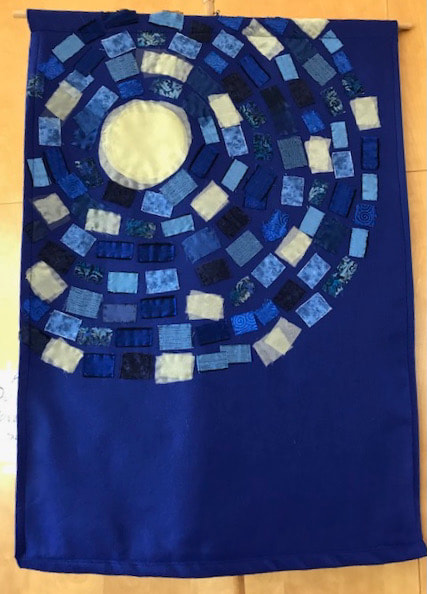
The scripture reading for this Epiphany Sunday, January 10, was Matthew 2:1-12. Rev. Laura Mayo gave the proclamation.
#CovenantTogether
#Theseareoursacredstories
The full text of this Sunday's proclamation is below:
Epiphany, this year, like that Epiphany of old, involved many revelations. Racism was on full display as white people in Trump and MAGA hats paraded inside the halls of Congress with basically no immediate consequences. We don’t need to reach far back in our history to remember that very same building blocked and guarded by officers in riot gear during a Black Lives Matter march. Watching the news on Epiphany, Black minister Rev. Jacqui Lewis tweeted, “So damn tired of living in a country that treats Black grief as a threat, and white rage as a sacrament.”
Sit with these words. We live in a country that treats Black grief as a threat and white rage as a sacrament. We live in a country where, as my friend Michelle Esinam said, “Tamir can’t play in the park. Breonna can’t sleep in her home. Sandra can’t drive in peace. Ahmaud can’t jog. But these people can storm the capital and get told to “go home peacefully.”
We saw over and over again this summer that overwhelmingly peaceful Black Lives Matter protests - protests that brought diverse people together, protests against the way Black people are treated in our country - we saw them met with brute force. We saw mass arrests, we saw cracked skulls, we saw officers pepper spraying through peaceful demonstrators for a photo op for the president. We saw rubber bullets and bodies treated with no respect.
We saw on Wednesday, the first day of Epiphany that the treatment Black Lives Matter received is not the only treatment officers are able to provide. For those who watched what was happening and thought this is not America. I need to tell you that you haven’t been listening. This is America. This is why Black Lives Matter is a movement, this is why the work of antiracism is so very important. If what happened this first day of Epiphany did not reveal the gaping chasm between the brutal responses to a movement for racial justice, brutal response to Black and brown bodies and the almost non-existent responses to white people storming our Capitol, I am not sure what will open our eyes.
It wasn’t just our racism that was revealed this Epiphany. Some members of Congress saw for the first time what our school children have long known. They saw what they expected to be a safe space invaded by violence. In interviews, so many members of Congress expressed shock that this could happen. But our school children are not shocked. They have drills because someday it might be their school. What will it mean that it was grownups who hid behind barriers and crouched down hoping to be spared from violent intruders? Will it mean that they see now, have they had an epiphany? Will these elected officials finally pass laws to keep our shared spaces safe.
More than a week ago at dinner I told our boys that I expected there would be protests and that I feared they would become violent. I assured them that we would do everything in our power to keep them safe and that our city was unlikely to experience the violence that some cities might. So, I was not surprised and I don’t believe that those who are in positions of power when it comes to protecting our Capital were unable to see this eventuality. Honestly, I don’t know how anyone was surprised. What we experienced this first day of Epiphany is the culmination of unchecked white supremacy, patriarchy, Christian nationalism, and lies. What this nation experienced this first day of Epiphany is the power of fear.
The Epiphany story in the Bible, much like the Christmas story of which it is a part, is shrouded in fear. In the Christmas story, Mary is told, “Do not be afraid, for you have found favor with God.” Joseph is encouraged, “Do not be afraid to take Mary as your wife.” The shepherds hear, “Do not be afraid. I bring you good news of great joy that will be to all people.” Do not be afraid. You don’t need these words unless you are afraid. There is a lot of fear in the Christmas story. Likewise, Epiphany begins with fear: “In the time of King Herod, after Jesus was born in Bethlehem of Judea, wise men from the East came to Jerusalem, asking, ‘Where is the child who has been born king of the Jews? For we observed his star at its rising, and have come to pay him homage.’ When King Herod heard this, he was frightened, and all Jerusalem with him.”
When King Herod heard about another ruler, when he heard he might lose his power, when he heard they might take away his tweets and his bully pulpit, when he heard, he was frightened, and all Jerusalem with him. We know this fear. We have lived this fear for years.
We are a divided country in many ways, but we are unified in fear. We are not afraid of the same things, not afraid of the same outcomes. The fear takes on a different shape depending on our perspectives. Still, we are all afraid.
Herod’s fear leads to violence. We rarely keep reading but the Epiphany story doesn’t stop with the wise ones leaving gifts and then refusing to go back to Herod. The story keeps going. After the wise ones return by another way, Jesus flees with his parents, to become refugees hidden away in Egypt while Herod orders the slaughter of innocent children. “Then Joseph got up, took the child and his mother by night, and went to Egypt . . . When Herod saw that he had been tricked by the wise men, he was infuriated, and he sent and killed all the children in and around Bethlehem who were two years old or under . . . Then was fulfilled what had been spoken through the prophet Jeremiah: ‘A voice was heard in Ramah, wailing and loud lamentation, Rachel weeping for her children; she refused to be consoled, because they are no more’” (Matthew 2:14-18).
Herod’s fear leads to violence. I have no doubt that fear was at the heart of much of what transpired this Epiphany. We know that fear makes people seek out the familiar, the comfortable, it makes us want to be protected, it makes us hold more tightly and to be wary of the unfamiliar. Fear makes us more susceptible to misinformation because it skews our thinking.
Trump has been using fear to tell us that Muslims are a threat, that immigrants and refugees must be kept out by walls or separating babies and children from their parents. Trump and his surrogates have been spreading fear and his followers have been stockpiling canned food and guns.
Fear makes us less able to deal with change. Many white people are afraid their way of life is coming to an end; that the lies of white supremacy are being seen for what they are and being dismantled. The racial makeup of the population of our country is changing. Soon more and more cities will be as diverse as our city already is and that horrifies some people.
Fear is no excuse for sedition; no excuse for terrorism; no excuse for violence. But knowing that fear is part of the driving force might help us to counter it. Fear can paralyse; it can leave us stuck: always seeking what we already know and what feels safe. Fear keeps us in fight, flight, or freeze - controlled often by our worst instincts. Jim Avera recently said, “I do not hope to live in a world based on my worst instincts.” I couldn’t agree more. You see it is not just those people who are afraid. I am afraid, too. I am afraid that what we are seeing, this manifestation of lies and manipulation, I am afraid that it is the beginning not the end, that it is not just who we are as a country now but also who we will continue to be.
I am afraid of what scared and angry white men with guns might do to my family, my community, my church, my country.
When Herod heard about Jesus he was afraid and all of Jerusalem with him. I understand Jerusalem’s fear. We must not get stuck in the fear. We, like those wise ones of old, we must go home a different way. Our anti-racist work must be redoubled, our work to end gun violence must be amplified, our efforts for police reform and healthcare reform and schools must be increased, our work for justice must become the air we breathe.
Fear can get us stuck. It can keep us doing the same things over and over, doing what is comfortable but, listen, we must go home a different way. We must repent and make changes and we must amplify the truth. Truth is an excellent counter to fear. When we learn about what seems at first to be frightening, we often find it was the unknown that was so scary, not the true reality.
The counter to fear in the Christmas story is truth. The angel tells Mary not to be afraid because she has found favor, because this is good news. The angel tells Joseph not to be afraid because there is more information about Mary, there is more to the story. The angels tell the shepherds not to be afraid because there is good news for everyone: God is here among us.
So we tell the truth. And we start with ourselves. We tell the truth about the racism and misogyny and violence in our own bodies and hearts and lives. And then we repent. We change. We tell the truth about our part rather than being defensive. We are culpable. We are part of the problem. We have work to do.
We see where fear and lies and anger lead. We say with our voices and our votes and money, No More. This is who we are but this is not who we will continue to be. We have choices. We are not powerless.
Herod was afraid. Jerusalem was afraid with him. Herod’s fear led to violence. Where will our fear lead? I pray that my fear and your fear will lead us to shine an Epiphany light on the truth, that it will lead us toward the Prince of Peace and the Kingdom of love and justice that Jesus taught and lived.
We’ve lied to ourselves and each other for far too long. We must be part of the truth-telling that will move us out of fear and into action. This is our task, this day and every day: to be part of truth-telling, to do the work of love and justice, to bring the realm of God’s love here on earth.
Amen
Written by Laura Mayo, January, 2021
 RSS Feed
RSS Feed
